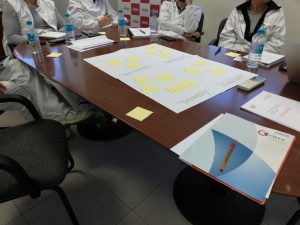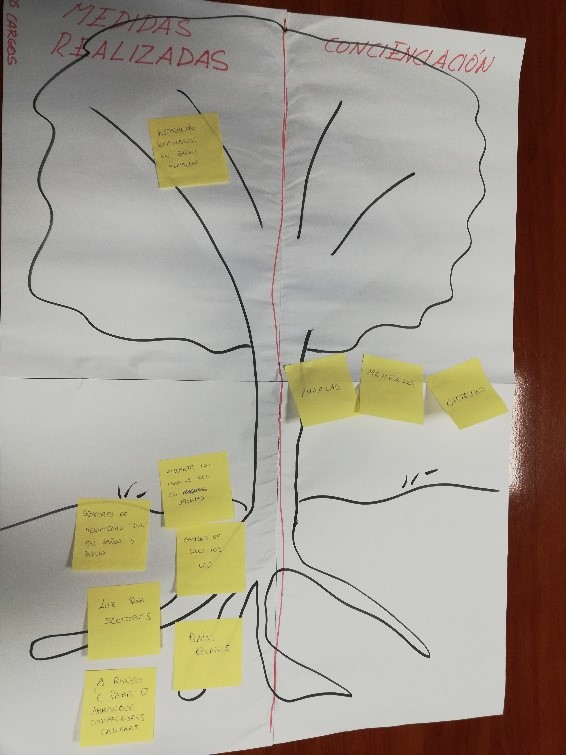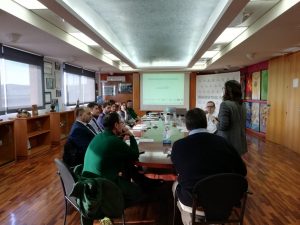
Agri-food companies are among the largest consumers of energies for heating, cooling processes and for storing food or beverages under controlled temperatures. Best energy practices help to reduce energy consumption. To achieve this, there are several possible entry points, including the behaviour of people in their work environment. In this context, the INDUCE project “Towards a sustainable agri-food Industry: Capacity building programs in energy efficiency” is developing an accessible online platform where training, online courses, procedures and other tools will be made available to food and beverage companies wishing to improve their energy efficiency. In addition, the INDUCE methodology is based on the study of organizational and behavioural models for influencing energy efficiency. It therefore aims at a change of culture and environment at the heart of the company in order to better involve employees and have sustainable results.
energies for heating, cooling processes and for storing food or beverages under controlled temperatures. Best energy practices help to reduce energy consumption. To achieve this, there are several possible entry points, including the behaviour of people in their work environment. In this context, the INDUCE project “Towards a sustainable agri-food Industry: Capacity building programs in energy efficiency” is developing an accessible online platform where training, online courses, procedures and other tools will be made available to food and beverage companies wishing to improve their energy efficiency. In addition, the INDUCE methodology is based on the study of organizational and behavioural models for influencing energy efficiency. It therefore aims at a change of culture and environment at the heart of the company in order to better involve employees and have sustainable results.
INDUCE has tested this methodology in 15 pilot companies, located in the 4 European countries that represent more than 45% of companies in the sector in the EU, i.e. Spain, France, the Netherlands and Germany.
The aim will then be to replicate it in 300 companies in the agri-food sector in the European Union. Approximately 5,000 employees are involved.

In Spain, the partner responsible for implementing the INDUCE Methodology in the 5 Spanish pilot companies is CIRCE (Research Centre for Energy Resources and Consumption), with the support of the consortium partner FIAB (the Spanish Food and Drink Industries).
The training activities in the pilot companies were planned regarding different previous assessments that analysed the respective needs and expectations of each company in terms of energy, energy efficiency and an in relation to an Energy Management System. The situation of each of the five pilot companies in Spain was completely different, although their interest in energy was quite similar. In the case of this country, taking into account the Spanish regulations on Energy Audits (RD 56/2016), some of the companies, due to the fact that these regulations apply to them, were familiar with the framework of an Energy Audit, including the usefulness of ISO 50001, instead of the others where it did not apply to them and therefore had to be considered in the training. For this reason, not only was the method used in each company different, but also the topics to be covered were adapted to each circumstance.
The INDUCE Methodology has as its main objective to adapt all the knowledge transfer on energy efficiency considering behavioural, organizational, and cultural factors in order to determine the best way to carry out the different activities that allow to establish an energy culture in the company and to try to motivate the employees to act in a more sustainable manner. Energy is a high cost in their business, and companies noted the need to acquire good energy skills, as well as to increase awareness among their employees. They were interested in learning about possibilities and best practices that would enable them to reduce their energy consumption. All of these needs were identified through a pre-analysis, through an assessment of the company, which included different surveys, interviews and an energy assessment, and were then analysed to see how they could be satisfied.
Depending on the company, different sessions were organized and, depending on the target group within each company for each session and the number of participants, the sessions were conducted in different ways. In addition to the various master classes on technical aspects that apply to this sector, relating to energy efficiency in thermal and electrical processes, as well as in horizontal utilities, the top management of the company was actively involved in this training since the beginning, participating in specific training, workshops or role-playing. In all sessions, the participation of the employees, either individual or in groups, has been crucial, especially in the workshops where collaborative actions and discussions have allowed them to better understand and share their own ideas to improve energy efficiency.
organized and, depending on the target group within each company for each session and the number of participants, the sessions were conducted in different ways. In addition to the various master classes on technical aspects that apply to this sector, relating to energy efficiency in thermal and electrical processes, as well as in horizontal utilities, the top management of the company was actively involved in this training since the beginning, participating in specific training, workshops or role-playing. In all sessions, the participation of the employees, either individual or in groups, has been crucial, especially in the workshops where collaborative actions and discussions have allowed them to better understand and share their own ideas to improve energy efficiency.